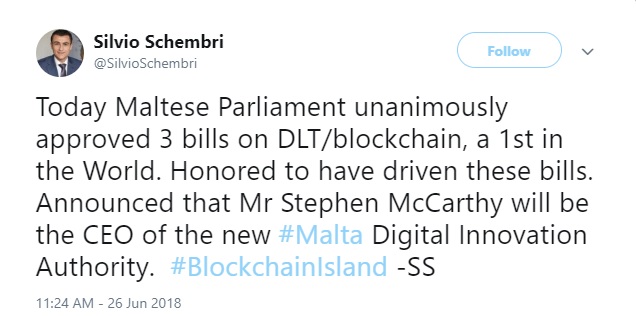27.06.2018
The Maltese Parliament yesterday voted unanimously to approve three crypto currency and blockchain bills. These bills that are designed to make Malta one of the most important and desirable locations in the blockchain space should now facilitate the setting up of further companies in this sector.
In a tweet shortly after the vote, Parliamentary Secretary for Digital Innovation Silvio Schembri said that he was honoured to have spearheaded the legislation through Parliament and also expressed thanks to all those who had collaborated on the project. He also announced that Mr Stephen McCarthy will be the new CEO of the Malta Digital Innovation Authority.

1. The Malta Digital Innovation Authority Bill
The Bill establishes the Malta Digital Innovation Authority (“the Authority”) and will focus on internal governance arrangements. The affairs and business of the Authority will be carried out by a Board of Governors. This Bill will also outline the duties and responsibilities of the Authority, one of the key roles being the certification of DLT platforms to ensure credibility and provide legal certainty to users wishing to make use of a DLT platform. The purpose of the surveyors and the certification of a DLT platform is to appraise the functioning of DLT platforms and ensure that the data being logged is accurate and genuine information. The Consultation Document issued on the 17th February 2018 proposed that the certification of a DLT platform will not be a mandatory requirement but will be made voluntary.
2. Technology Arrangements and Services Bill
This second Bill deals with the possibility for registration of Technology Service Providers and certification of Technology Arrangements (“TA”) with the possibility of having the TA being granted separate legal personality.
3. The Virtual Financial Assets Bill
The third and final Bill focuses on the regulatory regime applicable to Initial Coin Offerings (“ICOs”) and the regulation in respect of certain service providers which will be involved in activities related to ICOs. The Bill will also outline the regulatory regime which will be applicable to cryptocurrency exchanges.



